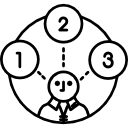What is computer science: Difference between revisions
Mr. MacKenty (talk | contribs) (Created page with "right|frame|System Fundamentals<ref>http://www.flaticon.com/</ref> This is pretty straight forward stuff. Nothing especially technical. We are concer...") |
Mr. MacKenty (talk | contribs) No edit summary |
||
| (22 intermediate revisions by the same user not shown) | |||
| Line 1: | Line 1: | ||
[[file: | [[file:computation.png|right|frame|What is Computer Science?<ref>http://www.flaticon.com/</ref>]] | ||
Computer science is about understanding the depth of a computer system, we care about how a computer system '''really works'''. We use our understanding, skill and knowledge to create programs to solve real problems. | |||
Computer science requires an understanding of the fundamental concepts of computational thinking as well as knowledge of how computers and other digital devices operate. | |||
- '''From the IB''' <ref>http://www.ibo.org/</ref> | |||
Computer science (CS) is the study of computers and algorithmic processes, including their principles, their hardware and software designs, their applications, and their impact on society.” - '''From the CSTA''' <ref>https://csta.acm.org/Curriculum/sub/CurrFiles/CSTA_K-12_CSS.pdf</ref> | |||
Computer science is the scientific and practical approach to computation and its applications. - '''From wikipedia''' <ref>https://en.wikipedia.org/wiki/Computer_science</ref> | |||
==== | == What is Computer Science? == | ||
The video below is embedded from youtube. It may take a moment to load. If on the off-chance it does not load, try [https://www.youtube.com/embed/-xFJM3QQ3TE clicking this link]. | |||
==== | <html> | ||
<iframe width="560" height="315" src="https://www.youtube.com/embed/-xFJM3QQ3TE" frameborder="0" allowfullscreen></iframe> | |||
</html> | |||
== Why Computer Science ?== | |||
'''A 21st Century Skill''' | |||
'''Computer science is...''' | |||
# a theory and practice that allows you to program a computer to do what you want it to | |||
# a tool that helps you tell a story or make something happen with technology | |||
# a discipline that emphasizes persistence in problem solving — a skill that is applicable across disciplines, driving job growth and innovation across all sectors of the workforce | |||
# a skill that teaches students how to use computers to create, not just consume | |||
'''Computer science is not...'''<ref>https://www.cs-first.com/why-cs</ref> | |||
# learning how to type | |||
# learning to use word processing, spreadsheet, or presentation software | |||
# learning how to build or repair computers | |||
# playing video games | |||
== References == | == References == | ||
Revision as of 07:12, 1 September 2019

Computer science is about understanding the depth of a computer system, we care about how a computer system really works. We use our understanding, skill and knowledge to create programs to solve real problems.
Computer science requires an understanding of the fundamental concepts of computational thinking as well as knowledge of how computers and other digital devices operate.
- From the IB [2]
Computer science (CS) is the study of computers and algorithmic processes, including their principles, their hardware and software designs, their applications, and their impact on society.” - From the CSTA [3]
Computer science is the scientific and practical approach to computation and its applications. - From wikipedia [4]
What is Computer Science?[edit]
The video below is embedded from youtube. It may take a moment to load. If on the off-chance it does not load, try clicking this link.
Why Computer Science ?[edit]
A 21st Century Skill
Computer science is...
- a theory and practice that allows you to program a computer to do what you want it to
- a tool that helps you tell a story or make something happen with technology
- a discipline that emphasizes persistence in problem solving — a skill that is applicable across disciplines, driving job growth and innovation across all sectors of the workforce
- a skill that teaches students how to use computers to create, not just consume
Computer science is not...[5]
- learning how to type
- learning to use word processing, spreadsheet, or presentation software
- learning how to build or repair computers
- playing video games